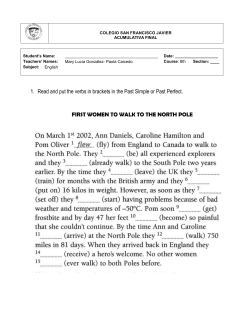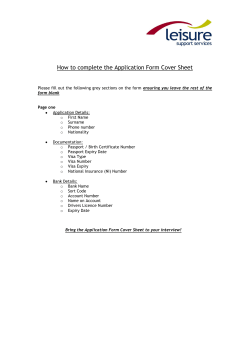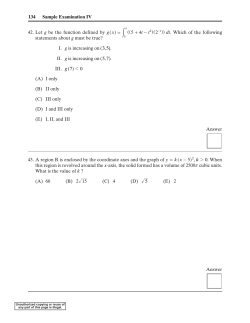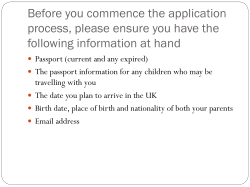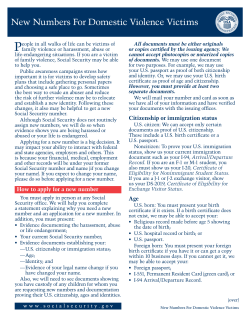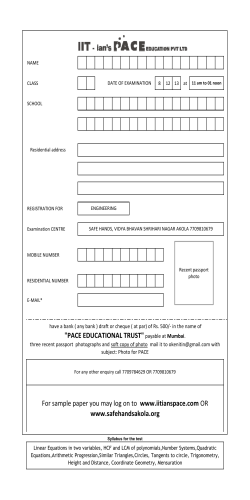
Enforcement Instructions and Guidance Chapter 2 – Entry
Enforcement Instructions and Guidance Chapter 2 – Entry without leave Index 2 2.1 2.2 2.3. 2.4 2.5 2.5.1 2.5.2 2.5.3 2.5.4. 2.6 2.6.1 2.6.2 2.6.3 2.7 Entry without leave Entry under Articles 8 and 9 of the Immigration (Leave to Enter and Remain) Order 2000 Clandestine entry Unwitting evasion of the control Procedures when a person has unwittingly evaded the control Entry by presenting false or forged British or EEA passports Procedures when a foreign national has entered by presenting a forged British or EEA passport Procedures when a person claims to be British or an EEA national Procedures when a person claims to be British and has entered on a correctly issued British passport Procedures when concluding that a suspected illegal entrant is British Entry without leave from the Republic of Ireland Procedures when a person has entered illegally from the Irish Republic Entry via the Irish land border The British-Irish Visa Scheme Illegal entry from the Channel Islands and the Isle of Man Mandatory systems checks For section 2.5.2, “the following checks should be conducted immediately into the British Identity: Official - sensitive – do not disclose – start of section The information in this page has been removed as it is restricted for internal Home Office use only Official - sensitive – do not disclose – end of section CRS If you have access to the Central Reference System (CRS) for visa applications made abroad, the person search is completed in a similar manner to that for CID. View the CRS guide here. Enforcement Instructions and Guidance CRS RAPid- IAFS If you have access to a RAPid machine, you can complete a mobile fingerprint check against the Immigration and Asylum Fingerprint System (IAFS). This will tell you if the individual has previously been fingerprinted by the Home Office. View guidance on RAPid checks here: RAPid 2 Entry without leave Section 3(1)(a) of the 1971 Act states that, unless allowed to do so by other provisions of the 1971 Act, persons who are not British citizens shall not enter the United Kingdom unless given leave. The new provisions for the granting of leave to enter otherwise than by notice in writing introduced by the 1999 Act do not alter the fact that leave to enter in whatever form it is given, is required by such persons (see 2.1.1). To enter without leave is to enter in breach of section 3(1) (a) and therefore constitutes illegal entry as defined by section 33(1) of the 1971 Act as amended by the 1996 Act. Under section 24(1) (a) of the 1971 Act, to knowingly enter without leave is to commit an offence punishable with a fine or with imprisonment for not more than six months or both. Entry without leave includes: clandestine entry; absconding; Evasion of the control. Return to top 2.1. Entry under Articles 8 and 9 of the Immigration (Leave to Enter and Remain) Order 2000 Most of the Immigration (Leave to Enter and Remain) Order 2000 came into force on 28 April 2000. The provisions on continuing leave came into force on 30 July 2000. Amongst other Enforcement Instructions and Guidance things, it provides for the granting and refusing of leave to enter otherwise than by notice in writing (article 8), and the granting or refusing of leave to enter by notice to a responsible third party (article 9). The granting or refusing of leave to enter otherwise than by notice in writing includes "by facsimile or electronic mail", and, also in the case of granting or refusing leave to enter as a visitor, "orally including by means of a telecommunications system". Leave to enter as a visitor means leave to enter for a period not exceeding six months subject to conditions, prohibition of employment and recourse to public funds. One situation in which the power to grant leave to enter orally might be exercised is in connection with the bulk clearance of passengers e.g. tour groups, following risk assessment and checks carried out by the port of entry. If, for example, a person claims to have last arrived on a coach with a tour group at a specified time and place, and to have been told verbally by an IO or responsible third party that he had been granted leave to enter for six months as a visitor, he would have to produce a coach ticket or provide some other evidence or explanation to show the manner and date of his entry. (Article 11 refers). If he did so, the burden is then on the IO to show that, on the balance of probabilities, he could not have been granted leave to enter at that time in the manner described. If the person cannot provide evidence or adequate explanation to support his statement, the IO can be satisfied that it has been proven, to the required high degree of probability, that he is an illegal entrant. It would, nonetheless be prudent for the IO to check back against port records each time such a method of entry is claimed, regardless of the plausibility of the person’s statement. If a person who claimed to have been given leave to enter verbally changes his mind and gives a different and plausible account of his method of entry, but can provide no evidence of this, he might be a NELE case (see Chapter 4). In these circumstances, the illegal entry contention will have to be re-examined as the onus is only on a person to show the manner and date of their entry under the provisions of Articles 8 and 9 of the Immigration (Leave to Enter and Remain) Order 2000, and not under any other provisions. Return to top 2.2 Clandestine entry Enforcement Instructions and Guidance Persons who enter the United Kingdom clandestinely are de facto illegal entrants. Methods of clandestine entry include persons who: enter concealed in a vehicle including lorries, vans, caravans, motor homes or any other commercial vehicle; stowaway on board ships and then enter without leave; arrive at ports of entry but then wittingly evade the control; Land at an uncontrolled point such as from a small boat or light aircraft. If a Police or Immigration Officer is satisfied that an illegal entrant has arrived clandestinely within the last 72 hours, by whatever means of transport – then the person’s arrival is a clandestine event. For enforcement purposes this would usually mean a ‘lorry drop’. Supporting evidence of clandestine entry provided through third party testimony (Police or a member of the public) or through debrief and search, is sufficient to deem the case suitable for reporting to the Intelligence Directorate using the appropriate intelligence proforma (Operation shorts). Enforcement officers will respond only to instances where the clandestine event has third party testimony and the subjects have been arrested and taken into custody. In such circumstances, enforcement officers will attend. In the exceptional circumstances in which the police do not make an arrest, it will be for the police to decide how to deal with the individual. When enforcement officers do attend a police station it should be borne in mind that an individual’s actual arrival date in the UK has not been confirmed at this stage. We still do not know for definite where they concealed themselves in the lorry i.e. overseas or in the UK. This may still not be apparent after an interview. The enforcement IO should put all relevant information about the circumstances of the encounter, including any statements made by either the individual or a third party onto CID. Supporting evidence of clandestine entry provided through third party testimony or through debrief and search, should also be noted on CID. Such evidence may also reveal that the individual has been in the UK longer than claimed. An enforcement officer should therefore not annotate the IS96 with ‘claimed on arrival’ in cases where the individual has already passed the port of entry, claimed asylum but is not being detained. The fact that ‘claimed on arrival’ is not on the IS96 does not actually mean that the Enforcement Instructions and Guidance individual will be considered to have failed to claim asylum as soon as reasonably practical on arrival in the UK. However, this is a decision for the asylum Case-worker not the enforcement officer. Separate arrangements exist for Kent and Thames valley. On the few occasions that enforcement officers are unable to attend to such instances the following procedure must be followed. A HMI or above should be consulted before the police or other agency is advised that enforcement cannot attend. The operational Assistant Director should be notified along with a written report of the reasons preventing attendance and the advice given to police or other agency on how to proceed. This report should be copied to the Deputy Director of operations immediately. Return to top 2.3. Unwitting evasion of the control Some people may unwittingly enter without leave, such as those who: present a passport to the IO on arrival who fails to endorse it when an endorsement is required for leave to enter to be granted; unwittingly by-pass the immigration control; unwittingly enter illegally from the Republic of Ireland; are believed by the IO on arrival to be still employed by a foreign embassy or international organisation and therefore exempt from control (provided no false representations are made); Pass through the EU Control when they are subject to control*. *e.g. when the holder of a British Overseas Citizen (BOC) or British Overseas Territory Citizen (BOTC) passport from Cyprus, erroneously, allowed to pass through the EU control without being granted leave to enter, because the IO thought they were the holder of a British Citizen passport and therefore had the right of abode. Enforcement Instructions and Guidance Such persons are illegal entrants but the unwitting nature of their entry may be a mitigating factor. Return to top 2.4. Procedures when a person has unwittingly evaded the control Interview under caution to establish the circumstances. The unwitting nature of his entry will be a mitigating factor and each case should be considered on its merits. Take account of the person's actions on arrival (e.g. if a passport was presented for endorsement but leave was not granted because of the IO's failure to endorse the passport when it was necessary to do so rather than because of the person's actions), the person's intentions on arrival, whether the IO would have granted leave and how long the person has delayed before coming forward. A person who has entered without leave has entered in breach of section 3(1) (a) of the 1971 Act and is an illegal entrant. Notice of illegal entry (IS151a) can therefore be served if there are no mitigating circumstances. If there is any doubt, refer to an Inspector. If there is still some doubt, the Inspector should refer to EPU if the query is on a matter of policy. If a person would have qualified for leave to enter, submit a report to a Home Office caseworking section, as it may be appropriate for them to grant leave to remain. Return to top 2.5. Entry by presenting false or forged British or EEA passports British Citizens and EEA nationals are exempt from control and do not require leave to enter the United Kingdom. Where a foreign national has entered by presenting a British or EEA passport, to which he is not entitled, he has entered in breach of section 3(1) (a) of the 1971 Act and is therefore an illegal entrant. Return to top Enforcement Instructions and Guidance 2.5.1. Procedures when a foreign national has entered by presenting a forged British or EEA passport Interview under caution. Where an admission is made, obtain details as to what type of passport was used, the whereabouts of the passport, whether the person's photograph was substituted, the name and other details in the passport or whether the person was a "look-alike". Establish the date of entry, if possible, and ensure that that date was the last entry to the UK. Where no admission is made, a comprehensive interview under caution should be made to establish the circumstances of entry. The person may be an illegal entrant in another category. Officers may also encounter persons who have presented British Visitor's Passports (BVPs) on arrival to which they were not entitled. (BVPs have not been issued since 1 January 1996.) In these cases, the person is an illegal entrant having entered in breach of section 3(1) (a) of the 1971 Act. Notice of illegal entry should be served (IS151a) and the following procedures followed. Return to top 2.5.2. Procedures when a person claims to be British or an EEA national If notice of illegal entry is served and detention maintained, it is imperative that all checks are undertaken immediately to prevent a possible compensation claim for unlawful detention in the event that a person proves to be British. Official - sensitive – do not disclose – start of section The information in this page has been removed as it is restricted for internal Home Office use only Enforcement Instructions and Guidance Enforcement Instructions and Guidance Enforcement Instructions and Guidance Official - sensitive – do not disclose – end of section Return to top 2.5.3. Procedures when a person claims to be British and has entered on a correctly issued British passport Where a person claims to be British and to have entered legally on a British passport which was correctly issued to him, and it is clear that he has been issued with a British passport, as in the case of Obi, the burden of proof lies with the IO to prove that he is not entitled to British citizenship and therefore not entitled to that passport. It is not enough to suspect he is not British, however. Proof of his true identity and nationality is necessary to establish that he obtained the British passport by deception. Where such cases are detected, illegal entry papers should not be served and detention should not be authorised until conclusive proof has been presented that he is not British. Return to top 2.5.4. Procedures when concluding that a suspected illegal entrant is British If you decide that the person is entitled to British citizenship, photograph him (with his consent) and complete a report stating that he has been accepted as the rightful holder of that identity, giving the reasons for this and listing any documents supplied (which should be photocopied). Make one copy of the report into a local file and send another to WICU with a photograph. Enforcement Instructions and Guidance Return to top 2.6. Entry without leave from the Republic of Ireland Entry to the United Kingdom from the Irish Republic is controlled by sections 1(3) and 9 of the 1971 Act and the Immigration (Control of Entry through Republic of Ireland) Order 1972 (as amended). The majority of persons who travel on local journeys between the Irish Republic and the United Kingdom are not subject to control but the following do require leave to enter the United Kingdom on arrival from the Irish Republic: persons who have entered the Irish Republic unlawfully e.g. clandestine entrants, seaman deserters, those entering on false documents (but not those who have been granted leave to enter the Republic from outside the Common Travel Area whether or not they used verbal deception, or those who were overstayers in the Republic); foreign nationals arriving by air in the Irish Republic from outside the Common Travel Area who are not given leave to enter and who then proceed in transit by air on an internal flight to the United Kingdom; visa nationals arriving in the UK from the Irish Republic without a valid UK visa and who do not qualify for visa exemption e.g. returning residents or those with extant leave granted for more than six months, or who do not qualify under the British-Irish Visa Scheme; illegal entrants and overstayers in the United Kingdom or Islands, and those who have entered the United Kingdom without leave, who cross to the Republic of Ireland from the United Kingdom and then return to the United Kingdom; persons who are the subject of an exclusion order or deportation order; Persons who have at any time been refused leave to enter the United Kingdom and have not since been given leave to enter or remain in the United Kingdom. Persons from the above categories who enter the United Kingdom from the Irish Republic without leave do so in breach of Article 3 of the Immigration (Control of Entry through Republic of Ireland) Order 1972 (as amended) and are illegal entrants. Enforcement Instructions and Guidance Return to top 2.6.1 Procedures when a person has entered illegally from the Irish Republic Interview under caution. Establish the person's date and means of entry to the Irish Republic, his immigration history in the UK if appropriate, the date and means of embarkation from the Irish Republic and subsequent entry to the UK and details of any visas. If illegal entry is established, serve notice of illegal entry (IS151a). Enforcement Instructions and Guidance Enforcement Instructions and Guidance 2.6.2. Entry via the Irish land border The Immigration (Entry Otherwise than by Sea or Air) Order 2002, which came into force on 17 July 2002, allows for the removal of persons who initially enter the UK illegally by crossing the Irish land border. Prior to this Order whilst illegal entry papers may have been served, there was no provision to enforce removal, although the person could sign a Disclaimer (IS101) and make a voluntary departure. The Order allows for removal directions to be given under paragraph 10 of Schedule II of the 1971 Act in respect of illegal entrants regardless of the date of entry (and under paragraph 8 of the 1971 Act in respect of any person who is refused leave to enter on or after the date of the Order). The Order allows for removal directions to be served on the captain, owner or agent of any train, vehicle, ship or aircraft. Persons detected upon arrival and who are still airside or marine side may be dealt with as passengers rather than illegal entrants. Return to top 2.6.3 The British-Irish Visa Scheme The British-Irish Visa Scheme, underpinned by amendments to the Immigration (Control of Entry through Republic of Ireland)(Amendment) Order 2014, allows for short term travel between the UK and Ireland, on the basis of a one visit visa, by approved nationals who are visa-required for the purpose of travel to or entrance into both the UK and Ireland. From the 28th October 2014, Chinese nationals will be able to enter the UK with an Irish visit visa endorsed with the coding “BIVS”. The Scheme will be extended to Indian nationals shortly after launch in China. This is the first phase of the Scheme and will be limited to these nationals applying from within their country of origin. Further rollout of the Scheme is subject to an evaluation of phase one in spring 2015. Holders of visas eligible under the Scheme, endorsed with “BIVS”, will be subject to standard checks on first arrival into the Common Travel Area (CTA) by the relevant border control authority, and enforcement action will be taken against those who are found to abuse the scheme in either the Republic of Ireland or the UK. See EIG Chapter 50.2.1 and EIG Chapter 51 for further details of the BIVS. Enforcement Instructions and Guidance Return to top 2.7 Illegal entry from the Channel Islands and the Isle of Man Paragraph 4 of Schedule 4 to the 1971 Act states,"...it shall not be lawful for a person who is not a British citizen to enter the United Kingdom from any of the Islands where his presence was unlawful under the immigration laws of that island unless he is given leave to enter". It follows that persons who were in the Islands without leave or who were overstayers or who were working there without permission (an admission or proof of this would be necessary) are illegal entrants if they do not obtain leave to enter on arrival in the UK from the Islands. Interview under caution. Establish immigration and working history in the Islands and serve notice of illegal entry if appropriate (IS151a). Return to top Revision History Date change published Officer/Unit 31/03/2009 OPPI Team 1D 27/11/2013 Enforcement & Returns Operational Policy 08/01/2015 Enforcement Operational Policy Specifics of change OEM Revision Rebranding and hyperlinking of Chapter Minor formatting changes: derestriction of last paragraph in 2.1; restricted boxes included; revision history published in external version New Content – Section 2.6.3 British Irish Visa Scheme Authorised by; Michael Simmons Version number after change (this chapter) 1 2 Kristian Armstrong 3 Kristian Armstrong 4
© Copyright 2025
